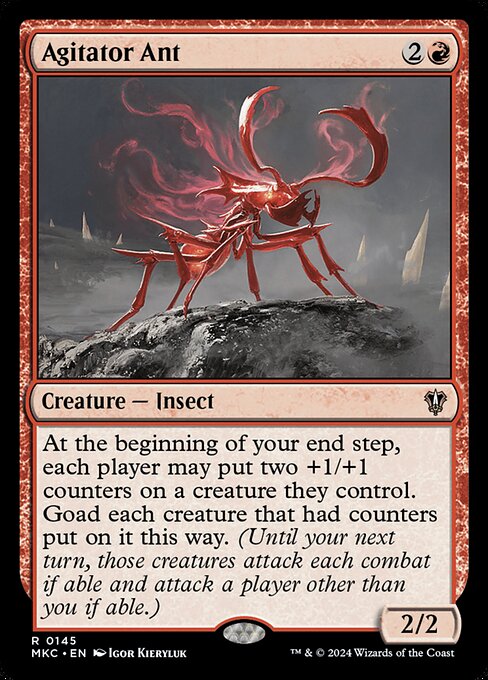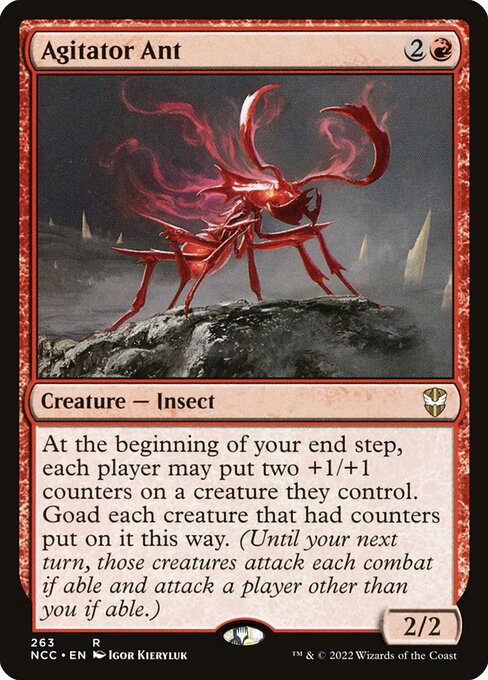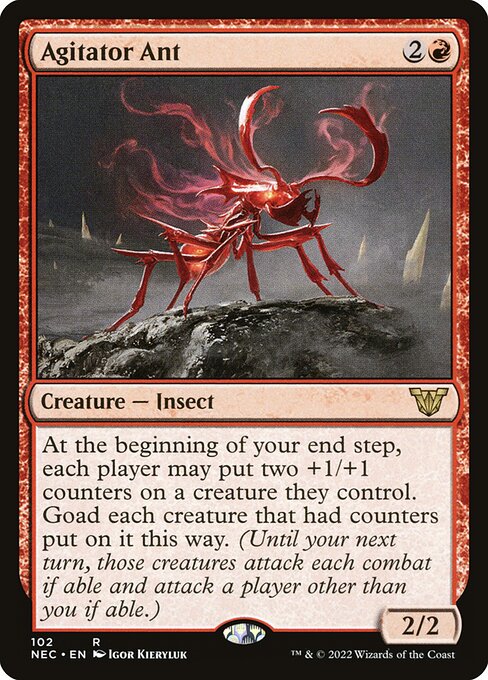Agitator Ant
Creature — Insect
At the beginning of your end step, each player may put two +1/+1 counters on a creature they control. Goad each creature that had counters put on it this way. (Until your next turn, those creatures attack each combat if able and attack a player other than you if able.)
2/2
standard
future
historic
gladiator
pioneer
explorer
modern
legacy
pauper
vintage
penny
commander
brawl
alchemy
paupercommander
duel
oldschool
premodern
Rulings
If a goaded creature doesn't meet any of the above exceptions and can attack, it must attack a player other than a player who goaded it if able. It the creature can't attack any of those players but could otherwise attack, it must attack an opposing planeswalker (controlled by any opponent) or a player who goaded it.
Being goaded more than once by the same player is redundant.
As Agitator Ant's ability resolves, first you choose which creature you control, if any, to put two +1/+1 counters on, then each other player in turn order does the same, knowing the choices made before them. Then each chosen creature receives its +1/+1 counters and becomes goaded.
If a goaded creature can't attack for any reason (such as being tapped or having come under that player's control that turn), then it doesn't attack. If there's a cost associated with having it attack, its controller isn't forced to pay that cost, so it doesn't have to attack in that case either.
If a creature can't have +1/+1 counters put on it, its controller can't choose it just to have it become goaded. If it can have counters put on it but replacement effects cause it not to receive +1/+1 counters, it doesn't become goaded.
Attacking with a goaded creature doesn't cause it to stop being goaded.
If you goad a creature you control, it must attack and it must attack a player rather than a planeswalker.
If a creature you control has been goaded by multiple opponents, it must attack one of your opponents who hasn't goaded it. If a creature you control has been goaded by each of your opponents, you choose which opponent it attacks.
Being goaded more than once by the same player is redundant.
As Agitator Ant's ability resolves, first you choose which creature you control, if any, to put two +1/+1 counters on, then each other player in turn order does the same, knowing the choices made before them. Then each chosen creature receives its +1/+1 counters and becomes goaded.
If a goaded creature can't attack for any reason (such as being tapped or having come under that player's control that turn), then it doesn't attack. If there's a cost associated with having it attack, its controller isn't forced to pay that cost, so it doesn't have to attack in that case either.
If a creature can't have +1/+1 counters put on it, its controller can't choose it just to have it become goaded. If it can have counters put on it but replacement effects cause it not to receive +1/+1 counters, it doesn't become goaded.
Attacking with a goaded creature doesn't cause it to stop being goaded.
If you goad a creature you control, it must attack and it must attack a player rather than a planeswalker.
If a creature you control has been goaded by multiple opponents, it must attack one of your opponents who hasn't goaded it. If a creature you control has been goaded by each of your opponents, you choose which opponent it attacks.
Rulings
If a goaded creature doesn't meet any of the above exceptions and can attack, it must attack a player other than a player who goaded it if able. It the creature can't attack any of those players but could otherwise attack, it must attack an opposing planeswalker (controlled by any opponent) or a player who goaded it.
Being goaded more than once by the same player is redundant.
As Agitator Ant's ability resolves, first you choose which creature you control, if any, to put two +1/+1 counters on, then each other player in turn order does the same, knowing the choices made before them. Then each chosen creature receives its +1/+1 counters and becomes goaded.
If a goaded creature can't attack for any reason (such as being tapped or having come under that player's control that turn), then it doesn't attack. If there's a cost associated with having it attack, its controller isn't forced to pay that cost, so it doesn't have to attack in that case either.
If a creature can't have +1/+1 counters put on it, its controller can't choose it just to have it become goaded. If it can have counters put on it but replacement effects cause it not to receive +1/+1 counters, it doesn't become goaded.
Attacking with a goaded creature doesn't cause it to stop being goaded.
If you goad a creature you control, it must attack and it must attack a player rather than a planeswalker.
If a creature you control has been goaded by multiple opponents, it must attack one of your opponents who hasn't goaded it. If a creature you control has been goaded by each of your opponents, you choose which opponent it attacks.
Being goaded more than once by the same player is redundant.
As Agitator Ant's ability resolves, first you choose which creature you control, if any, to put two +1/+1 counters on, then each other player in turn order does the same, knowing the choices made before them. Then each chosen creature receives its +1/+1 counters and becomes goaded.
If a goaded creature can't attack for any reason (such as being tapped or having come under that player's control that turn), then it doesn't attack. If there's a cost associated with having it attack, its controller isn't forced to pay that cost, so it doesn't have to attack in that case either.
If a creature can't have +1/+1 counters put on it, its controller can't choose it just to have it become goaded. If it can have counters put on it but replacement effects cause it not to receive +1/+1 counters, it doesn't become goaded.
Attacking with a goaded creature doesn't cause it to stop being goaded.
If you goad a creature you control, it must attack and it must attack a player rather than a planeswalker.
If a creature you control has been goaded by multiple opponents, it must attack one of your opponents who hasn't goaded it. If a creature you control has been goaded by each of your opponents, you choose which opponent it attacks.
Your collection? Your decks?
Want to manage your collection and/or create decks?
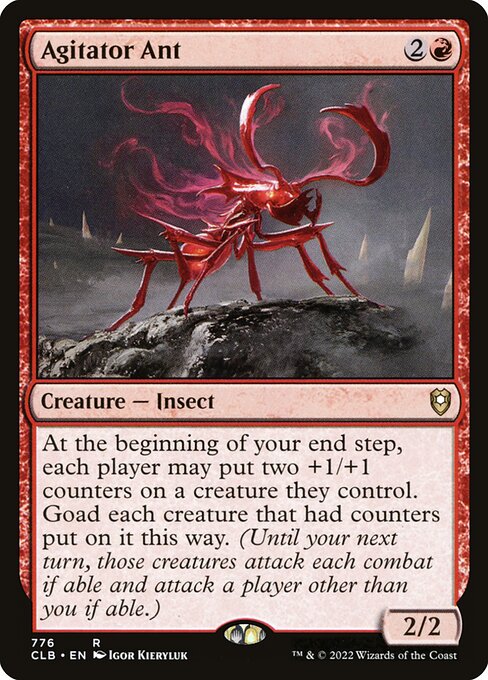

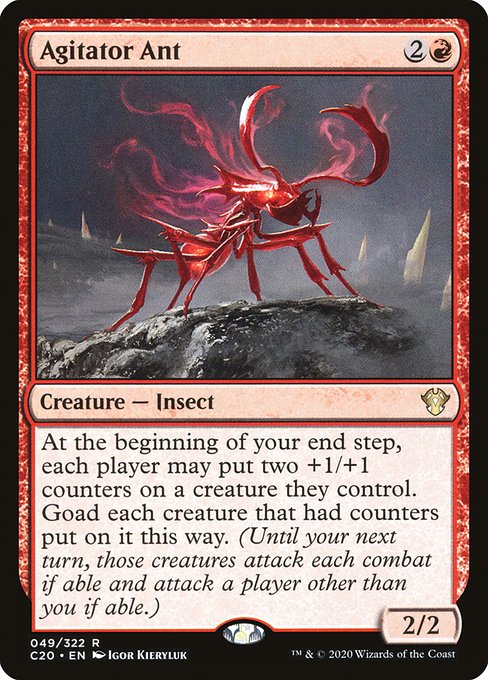
 0
0
 0.19€
0.19€
